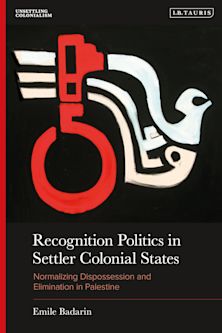- Home
- ACADEMIC
- Middle East
- Israel / Palestine
- Thinking Palestine
You must sign in to add this item to your wishlist. Please sign in or create an account
Description
This book brings together an inter-disciplinary group of Palestinian, Israeli, American, British and Irish scholars who theorise 'the question of Palestine'. Critically committed to supporting the Palestinian quest for self determination, they present new theoretical ways of thinking about Palestine. These include the 'Palestinization' of ethnic and racial conflicts, the theorization of Palestine as camp, ghetto and prison, the tourist/activist gaze, the role of gendered resistance, the centrality of the memory of the 1948 Nakba (catastrophe) to the contemporary understanding of the conflict, and the historic roots of the contemporary discourse on Palestine.
The book offers a novel examination of how the Palestinian experience of being governed under what Giorgio Agamben names a 'state of exception' may be theorised as paradigmatic for new forms of global governance. An indispensable read for any serious scholar.
Table of Contents
Introduction: Thinking Palestine - Ronit Lentin
Part I: The Palestinianization of Race
1. Racial Palestinianization - David Theo Goldberg
2. Globalizing racism and myths of the other in the war on terror - Gargi Bhattacharyya
Part II: Palestine: Biopolitics and States of Exception
3. Bio-power and thanato-politics: The case of the colonial occupation in Palestine - Honaida Ghanim
4. Palestinian Refugee Camps in Lebanon: Laboratories of State-in-the-Making, Discipline and Islamist Radicalism - Sari Hanafi
5. Sovereignty and the state of exception: al-Ansar mass detention camp in Lebanon - Laleh Khalili
6. The ghettoization of Palestine - Alina Korn
7. The persistence of the exception: Some remarks on the story of Israeli constitutionalism - Raef Zreik
8. The Mukhabarat State of Israel: A State of Oppression is not a State of Exception - Ilan Pappe
Part III: Palestine: Contested Representations
9. Palestinian 'Munadelat': Between Western Representation and Lived Reality - Nahla Abdo
10. Authenticity and political agency on study trips to Palestine - David Landy
11. The contested memory of dispossession: Commemorizing the Palestinian Nakba in Israel - Ronit Lentin
12. The state, the text and the critic in a globalized world: The case of Edward Said - Conor McCarthy
13. Understanding the present through the past: Between British and Israeli discourses on Palestine - Anaheed Al-Hardan
Product details
| Published | 18 Jul 2013 |
|---|---|
| Format | Ebook (Epub & Mobi) |
| Edition | 1st |
| Extent | 400 |
| ISBN | 9781848137899 |
| Imprint | Zed Books |
| Publisher | Bloomsbury Publishing |
About the contributors
Reviews
-
The book should be read closely by serious pro-Palestinian activists wishing to sharpen their conceptual tools in the ceaseless battle against Zionist propaganda.
Electronic Intifada, August 2008
-
This book presents us with sharp critical thinking about everything from the applicability of Agamben's concept of the "state of exception" or Foucault's theory of modern "biopower" to Israel's control over Palestinians in prisons, camps, and ghettoes, to the specific dynamics of racialization, colonial violence against, and appropriation of Palestinians, even by the well-meaning. Both theorizing and chronicling the varied forms of Israeli power, these provocative essays are grounded in details that can still shock.
Lila Abu-Lughod, Columbia University
-
This timely volume provides a fresh epistemological framework to think Palestine in the context of the Israeli colonial occupation of its territories as well as of its dispersed populations. It shifts the center of gravity from the temporal dimension of 'state of exception' to its spatial as well as its racializing features. The book makes an important critical contribution to political theory and deserves to be read by anyone concerned with the question of Palestine.
Yehouda Shenhav, Tel-Aviv University

ONLINE RESOURCES
Bloomsbury Collections
This book is available on Bloomsbury Collections where your library has access.



































